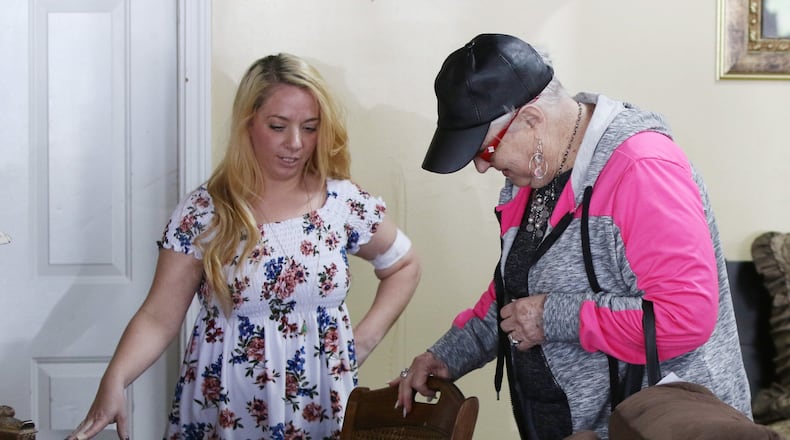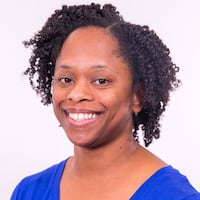DON'T MISS IT: AJC Subscribers get exclusive access to expanded daily county by county coverage like this each day in the Metro section. Check the ePaper or pick up The Atlanta Journal-Constitution for our organized 4-page County by County section. It provides details you won’t find anywhere else.
Michelle Youghn has been sober for 18 months, and attributes her ability to stay away from drugs to Missy Owen, the executive director of Davis Direction Foundation, which provides support and education for those battling addiction.
“I’m blown away every time I think about what they are doing,” the mother of two said, giving credit to Owen for helping her save her family.
Owen is the face behind the foundation as well as The Zone, which recently celebrated the opening of a second thrift store to help raise money for its efforts to support people in recovery. Called Re-Zoned, this boutique thrift store on North Fairground Street in Marietta will work in tandem with the original thrift store — The Zone — to assist those efforts.
Along with its thrift store, The Zone is also outfitted with a coffee shop and space for yoga, Bible studies and music; computer labs, a kitchen and an entertainment center. Since Re-Zoned opened, Owens said the foot traffic has been "amazing."
“This community is one of the most giving and generous communities I have ever known,” she said.
Owen said there are about 3,500 visits to The Zone each month. With a steady stream of visitors, the Davis Direction Foundation continues to solicit donations and grants from the community, as well as to inform the public about its presence in Cobb County.
Owen and her husband founded Davis Direction Foundation after the death of their son, Davis, who overdosed on heroin in March 2014.
Like Cobb County News Now on Facebook | Follow us on Twitter
It doesn't appear her services will become less important anytime soon, as Owen said the number of people seeking help from her nonprofit has held steady for the past three years. She also said she's noticed an increase in methamphetamine use in Cobb and a very slight decrease in opioid deaths.
“It’s not enough that we are going to celebrate yet because it’s still very, very similar to those past two years,” she added.
According to the Cobb County Medical Examiner's Office's 2017 report (the latest available), there were 163 deaths classified as drug or alcohol related, compared to 141 in 2016. Cobb County is the epicenter of the rise in opioid use, and deaths stemming from opioids were 128 in 2017 compared to 96 in 2016. The county led the state and other large counties in 2017 in the reported number of opioid overdose deaths, former District Attorney Vic Reynolds said.
Owen said she hopes the medical examiner’s report for 2018, which is expected soon, will confirm that opioid-related deaths have declined a bit. To help address the problem, the foundation has established a Recovery Roundtable Leadership Council to allow stakeholders, elected officials and others to share what they are doing to fight drug use.
READ | Opioids feed surge in Atlanta region's fatal overdoses
For Youghn, addressing the problem of addiction begins with talking about it and sharing her bumpy path to recovery. The Acworth resident said she started out experimenting with drugs and alcohol while she was still a teenager.
“It was all fun and games for quite some time,” she said. Her use spiraled out of control as she began using prescription painkillers and progressed to heroin. Youghn said her parents eventually “drop-kicked” her into rehab in 2013, but she wasn’t ready.
Youghn had her first child in 2014, and that life-changing experience made her begin thinking seriously about kicking her habit. She went to rehab in 2015 and another time in 2016, but relapsed nine months later. She got pregnant and had her second baby in 2017. During that time frame she met Owen, who helped her get into a detox program at Northside Hospital and a rehabilitation program in DeKalb County.
Youghn said she uses her experience to show people how far she’s come in her life. Her story, she said, is a miracle, as she went from someone “who stuck a needle in my arm” to a person who has a full-time job, has custody of her two children, and volunteers at The Zone.
Learning about addiction has taught Youghn that her battles were not a result of being a “moral failure,” but of being sick. She hopes her story will help break down the stigma surrounding drug use and addiction.
“I’m blown away by God’s grace,” she said. “Recovery is real and it’s possible. It takes dedication and desperation.”
About the Author
The Latest
Featured



